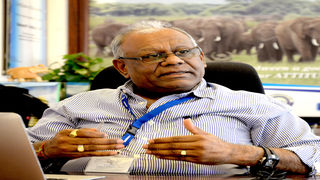
Atul Shah, Nakumatt's former CEO.
| Salaton Njau | Nation Media GroupNews
Premium
Why slain Nakumatt auditor's widow could go after Atul Shah's assets
On May 7, 2015 Nakumatt auditor James Karanja died after being shot three times in the head and chest.
The auditor was just about to blow the lid on how senior managers were scheming up to Sh1 million daily from the retailer’s tills when he was felled.
Nakumatt had taken out an insurance policy for Mr Karanja that was to see the auditor’s family get Sh30 million in the event that he died while still an employee. The service was provided by Kenindia Insurance.
On September 11, 2015— just over four months after Mr Karanja’s murder — Kenindia Insurance released the Sh30 million payout to Nakumatt, which was in turn meant to send the funds to Mr Karanja’s widow, Latoya Mghoi Kaka.
But the retailer pocketed the cash and used it to fund its operations that have since collapsed. And since the auditor’s brutal murder in 2015, Ms Kaka has been chasing after Nakumatt, in her capacity as the administrator of Mr Karanja’s estate, to have the family compensated.
Ms Kaka joined the insolvency petition filed by Nakumatt creditors and laid her claim in the suit.
Pursue Shah
Last week, High Court judge Alfred Mabeya allowed Ms Kaka to pursue Nakumatt owner Atul Shah in his individual capacity for the insurance payout. Ms Kaka filed a suit against Nakumatt and Mr Shah on September 11, seeking payment of the Sh30 million.
Nakumatt and Mr Shah opposed the suit, arguing that Ms Kaka is already listed as creditor number 50 in the insolvency petition that felled East Africa’s biggest retail chain at the time. They added that the fresh suit is sub judice – legal speak for interference with a different ongoing set of legal procedures – of the insolvency petition.
But Ms Kaka denied that she is a creditor, but a beneficiary of an insurance policy.
She added that the money from Kenindia was not Nakumatt’s to spend, as the retailer was only a conveyor belt to get the insurance payout to Mr Karanja’s family.
Ms Kaka argued that the fresh suit is entirely different from her claim in the insolvency petition, in that the latter is seeking to pursue Nakumatt and Mr Shah for monies the collapsed retailer held in trust for her family.
Justice Mabeya agreed with Ms Kaka, as he ruled that the two cases are independent of each other.
“What I understood Ms Kaka to be saying is that monies meant to the estate was paid to the company for onward transmission to her in 2015. However, for unknown reasons the company through its directors, Mr Shah included, failed to act as proper trustees in respect thereof and converted the same.”
“In this regard, Ms Kaka’s claim herein is completely different from the insolvency proceedings. In those (insolvency) proceedings, all that will be dealt with is whether the assets of the company will be adequate to settle the company’s debts. In these proceedings, the question will be, how did the company through its directors deal with the trust property meant for the estate of the deceased,” Justice Mabeya said before dismissing the objection to the fresh suit.
The ruling means that Ms Kaka will be allowed to present her case against Nakumatt and Mr Shah, and a victory could allow her to trace and auction assets of either Nakumatt or Mr Shah to recover the Sh30 million.
Ms Kaka has been listed as an unsecured creditor in the insolvency petition. Unsecured creditors are individuals or companies whose debts have no collateral.
During the liquidation of companies, unsecured creditors are the last to get paid and miss out in the event money runs out before they receive a cent.
The fresh suit has revealed that Ms Kaka had requested Nakumatt to prioritise the Sh30 million owed to her family. Nakumatt administrator Peter Kahi Obondo did not honour the request.





